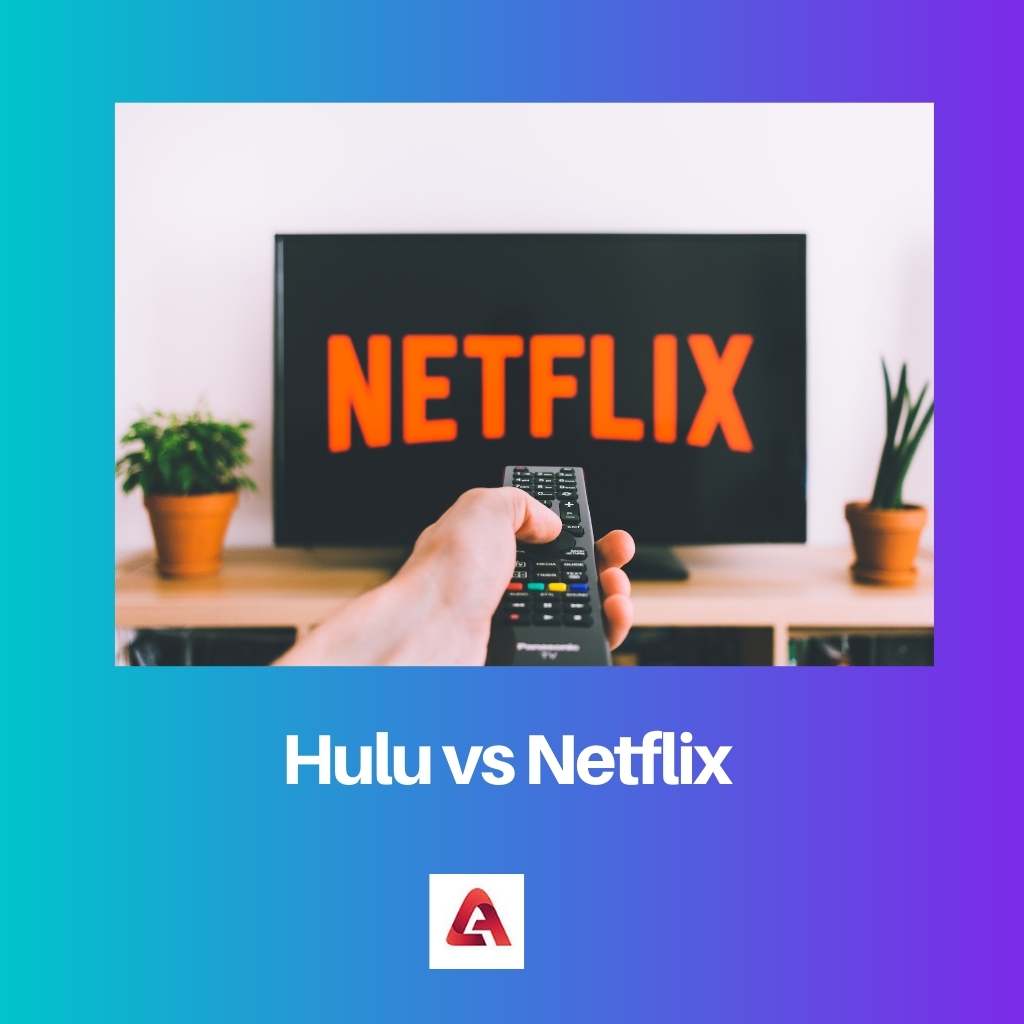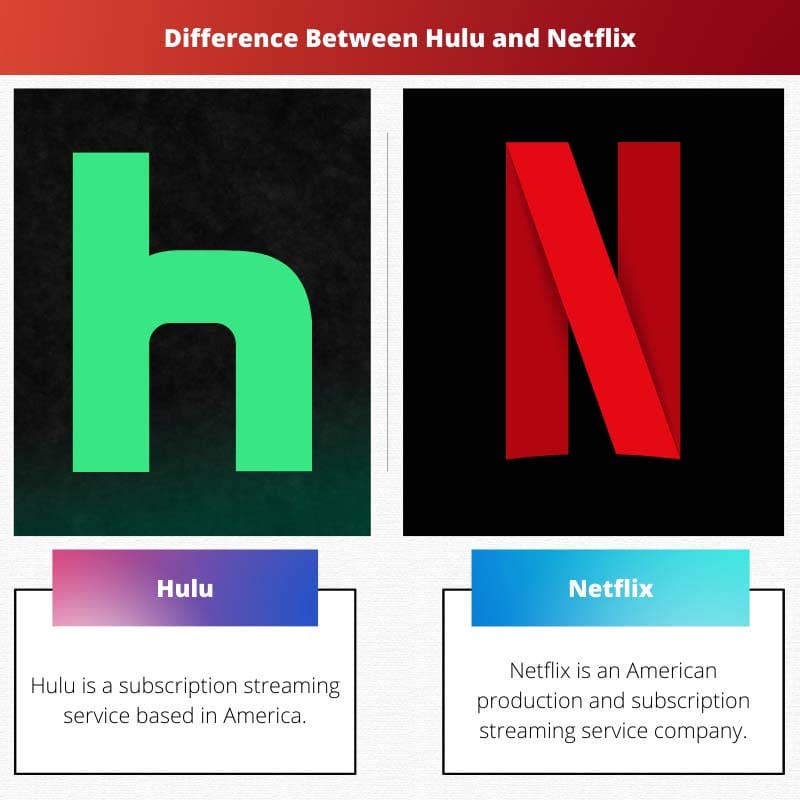Streaming refers to any media content which is recorded or live. It is delivered to mobile and computer devices with the help of the Internet, and in real-time, they are played back.
Among the best streaming services Hulu and Netflix are two of them.
Their popularity is because they have been around for ages and earned pretty obvious reputations. The main focus is to provide content like originals, licensed TV movies, shows, etc.
Apart from being streaming services, there are many differences between them. The article’s main focus is to highlight the differences between Hulu and Netflix.
Key Takeaways
- Hulu offers current TV shows, next-day access to new episodes, and live TV options.
- Netflix provides a large library of movies, TV shows, and original content but lacks live TV.
- Hulu has ad-supported plans, whereas Netflix offers an ad-free experience across all plans.
Hulu vs Netflix
Hulu primarily focuses on TV shows and offers a variety of current and past seasons of popular shows from networks such as NBC, ABC, and Fox. Netflix has a more diverse selection of TV shows and movies from various networks and studios. Netflix is known for its extensive collection of original content.

Hulu is a video-on-demand service that is based on the Internet. It is founded by major broadcast networks such as Fox Entertainment, Disney ABC, and NBCUniversal.
It offers a free service of TV programs and movies in limited amounts in SD or standard definition for viewing only on personal computers.
Netflix allows members to watch movies and TV shows without commercials on devices connected to the Internet. It allows downloading movies and TV shows to Android, Windows 10, or iOS devices to watch an absence of an Internet connection.
Comparison Table
| Parameters of Comparison | Hulu | Netflix |
|---|---|---|
| Founded | 2007 | 1997 |
| Headquarters | Los Angeles, California, US | Los Gatos, California, US |
| Audio quality | Stereo sound | Dolby Digital |
| Ads | Even with Hulu Plus it is yes but there is an option to pay for no ads | No |
| 4K content | Yes | Only with premium netflix |
What is Hulu?
Hulu is a subscription streaming service based in America.
Hulu offers a library of television series and films through distribution deals with networks such as ABC, FOX, Disney Channel, ESPN, Fox Business, Freeform, BBC America, Fox News, 20th Century Studios, and Hulu Originals.
Hulu is owned by Disney Company with NBCUniversal of Comcast, which holds a minority stake. Initially, it was established between NBCUniversal and News Corporation, Providence Equity Partners.
Later, The Walt Disney Company aggregates television series’ recent episodes from their respective television networks.
Hulu was the first streaming service that added “plus” to its name by launching a subscription service in 2010.
Initially, it was branded as Hulu Plus and from the companies and other partners to feature full seasons of programs and also undelayed access to episodes launched recently.
In 2017, Hulu launched Hulu with Live TV, which is an over-the-top IPTV service that features linear television channels.
The former president of Hulu, namely Kelly Campbell, exited the company in October 2021. On October 8, 2021, Disney raised its annual and on-demand subscriptions.

What is Netflix?
Netflix is an American production and subscription streaming service company.
It offers Netflix originals as its production as well as a library of television and film series through distribution deals.
It is available across the world except in mainland Crimea, China, Syria, and North Korea.
There are mainly 214 million subscribers of Netflix worldwide, according to October 2021.
In Canada and the United States, there are 74 million subscribers, 70 million in the middle east, Europe, and Africa, and in Latin America, there are 39 million. At last, the East Pacific has approx. 30 million.
Initially, Netflix was sold as well as rented DVDs by mail. Within a year, the sales were eliminated, and we started focusing on the business of DVD rental.
In 2007, it introduced streaming video and media on demand. In 2010, Netflix expanded to Canada, followed by the Caribbean and Latin America.
In independent film distribution, Netflix has played a prominent role. Compared to other distributors, for TV shows upfront, Netflix pays more but keeps the upside on big hits.
In 2013, it entered the content-production industry by debuting its first series, namely House of Cards.

Main Differences Between Hulu and Netflix
- Hulu focuses on what is trending and the availability of shows are the very next year of being aired. Conversely, Netflix has extensive collections of previous seasons of current series as well as old series.
- The video quality provided by Hulu is 480p, 288p, 360p, and sometimes 720p HD. Meanwhile, Netflix offers video quality like Tier 1: DVD quality, Tier 2: better than DVD quality, tier 3: 720p, and Tier 4: 1080p HD have been introduced.
- When it comes to products, Hulu offers video on demand and primarily TV shows consisting of content season shows. In contrast, Netflix offers products like video streaming on-demand and online Blu-ray discs and DVD rental.
- In terms of anime, many anime titles are available on Hulu, which are mostly subbed. On the other hand, there are only a few anime titles on Netflix which are mostly dubbed.
- Moving on to content for children, Hulu has content for kids, but the priority remains what is trendy. On the flip side, Netflix is the right choice for children’s content as it is exclusive to ’Netflix for kids,’ allowing youngsters to navigate their way to whatever content they watch.

- https://scholar.google.com/citations?view_op=search_authors&mauthors=hulu&hl=en&oi=ao
- http://brettb.net/project/papers/2007%20The%20Netflix%20Prize.pdf

The comparisons made in terms of quality, content, and audience targeting provide valuable insights for consumers who are considering the differences between Hulu and Netflix.
The article effectively contrasts the content offerings, target audiences, and technical capabilities of Hulu and Netflix, facilitating an informed analysis of their differences.
The key differences presented in the article provide a very informative overview of how Hulu and Netflix differ in their services.
The detailed background information of Hulu and Netflix provides a comprehensive understanding of their respective origins and evolution in the streaming industry.
Hulu’s focus on TV shows and Netflix’s diverse selection of content demonstrate their distinct strategies in catering to viewers’ preferences.
The availability of Hulu with Live TV and Netflix’s global subscriber base illustrate the evolving nature of streaming services and their impact worldwide.
The comparison table effectively highlights the main distinctions between Hulu and Netflix in a clear and concise manner.
The distinction in audio quality mentioned in the comparison table is an important factor to consider when choosing between Hulu and Netflix.
Hulu’s ad-supported plans and Netflix’s ad-free experience offer valuable insights into each platform’s user experience.
Netflix’s availability of 4K content is a significant advantage over Hulu for users seeking higher video quality.
The comparison between Hulu and Netflix’s focus on animated shows, children’s content, and video quality provides a nuanced understanding of their distinct offerings in the streaming landscape.
Both Hulu and Netflix have unique strengths in terms of content and user experience, as outlined in the article, which allows for a comprehensive evaluation of their respective features.